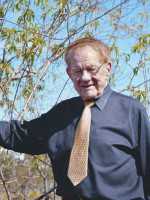The Last Word: Remembering Doc Childers

The “grand old man of Horticulture” is gone. Dr. Norman Franklin Childers was 100 years old when he passed away on April 24 after a lifetime of achievement educating and training fruit growers and scientists.
He was a product of the land grant college system and its greatest supporter and defender. He is one of a remarkable line of leaders who devoted their lives to fruit science, and whose ranks are being thinned as more funding goes to the new sciences of biotechnology, genomics, and nanotechnology. He fought against the decrease in funding for workers involved in the personal and practical development of the art and science of horticulture, continually emphasizing that on site research, training, and help are still vitally needed.
He was energetic, hardly ever took a vacation, and not only was a leader in applied research, but also took great enjoyment in teaching and getting out and working in the orchards with growers.
He had the genes of an editor. His book, “Modern Fruit Science,” was translated into four languages and went through many editions. His strawberry book sold out and he brought out a new edition. His blueberry book is a classic and has stimulated a growing blueberry industry across the country. He also edited “Fruit Nutrition,” “The Peach,” and “The Pear.” He edited the Hort News for New Jersey for 29 years, and was editor of the Proceedings for the Florida Hort Society for 12 years.
He was born in Moscow, ID, where his father was head of the Soil Science department at the University of Idaho. His father was one of the first county agricultural Extension agents, and Norm followed in his footsteps, getting his BS and Masters degrees at University of Missouri, and a Ph.D. in Pomology under Professor A. J. Heinicke at Cornell.
After spending four years on tropical ag research in Puerto Rico, he moved to Rutgers University in New Jersey in 1947 where for 18 years he headed the Hort Department. After retirement in 1981, he moved to Gainesville and the University of Florida where he was an adjunct professor for many years. Even as an adjunct professor, he was able to create enthusiasm for the practice of horticulture. He started a course for all students called “Growing Fruits For Fun And Profit.” At one time, he had more than 400 registered from all over the University.
He has won numerous awards. His favorite association was the American Society for Horticultural Science where he missed only three meetings in 65 years. He has endowed awards for hort students and grad students to encourage people to get into horticulture and pomology in order to keep the art and science and practice available to everyone. He often said he would like to be remembered for the students he taught and trained and supported with scholarship awards and endowments. He is proud of the fact that these efforts will continue as he provided for them in his estate plan.
When asked what the secret was to his longevity, he said, “There is no secret. I think the reason is that I have kept busy. No sitting around. That and having a healthful diet.”




